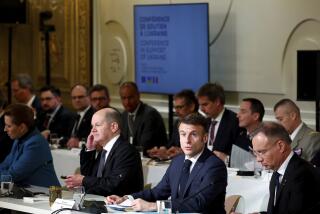NATO rapid-response military force proposed
- Share via
LONDON — Seeking to reassure countries that have grown fearful of Russia, Western defense ministers will consider the creation of an easily deployable military force that could be sent into nations feeling threatened, a senior U.S. Defense official said Thursday.
The creation of such a force would take NATO back to its roots as a deterrent against Soviet might after years of concentrating on missions in Kosovo and Afghanistan. North Atlantic Treaty Organization defense chiefs plan to discuss the proposal at a meeting today. The Bush administration is pushing the idea as a compromise that could reassure allies without provoking Russia.
However, Secretary of State Condoleezza Rice stepped up the Bush administration’s denunciation of Moscow, alleging in a speech in Washington that Russia had shown a “worsening pattern of behavior” in which it was “increasingly authoritarian at home and aggressive abroad.”
Defense Secretary Robert M. Gates sounded a more moderate line speaking to reporters in London. “We need to proceed with caution,” Gates said, “because there are a range of views on how to respond from some of our friends in Eastern Europe and the Baltic states to some of the countries of Western Europe.”
Although he didn’t mention the proposed NATO force, it could serve as such a compromise solution.
The deployment force being considered would be small, light and defensive in nature. However, some Defense officials acknowledge that any NATO move has the potential for provoking Moscow’s anger.
The senior Defense official, who described the proposal on condition of anonymity, said there was broad support within the alliance but that key issues were undecided. They include questions about who would provide equipment for the force, who would have the authority to deploy it and under what situations.
The U.S. previously has pushed to create NATO rapid-reaction forces, with little success. The reemerging sense of threat from Moscow may provide incentive, but some Defense officials are uncertain that NATO countries will invest in the necessary equipment and personnel.
Under the NATO charter, an attack on one member is considered an attack on all. But newer members have questioned whether the alliance has the will or capacity to fulfill the charter, the official said.
“The question is going to be somewhat existential: Are we what we say we are?” said the official. “We simply aren’t building the capabilities we say we must have.”
Rice, delivering a major policy speech at a meeting of the German Marshall Fund, accused Russia of intimidating neighbors, selling arms to countries and groups that threaten peace, using oil and gas as a “political weapon” and persecuting dissidents.
Rice’s remarks underscored a somewhat unusual situation in which the administration’s top diplomat seemed to be speaking more forcefully than its Defense chief. Gates, while condemning Russia’s actions, repeatedly has warned against overreaction.
Rice did not lay out any major new punishment for Russia’s incursion in Georgia. U.S. officials have acknowledged that they need Moscow’s cooperation on international issues, such as Iran and North Korea’s nuclear programs, and have limited leverage.
However, U.S. officials have decided to withdraw their support for Russian membership in the World Trade Organization and the Organization for Economic Cooperation and Development, the State Department said after Rice’s speech. Those moves are not likely to be viewed by Moscow as a serious setback.
The Bush administration was the chief advocate for Russian entry into the WTO, and without its backing the idea likely will die. Rice said U.S. allies need to show Moscow that it is wrong in its view that “if you pressure free nations enough -- if you bully, threaten and lash out -- we will cave in, and forget.”
Rice ridiculed the Russian recognition of two pro-Moscow breakaway territories in Georgia as independent states, noting that international support had been very limited.
“A pat on the back from [Nicaraguan President] Daniel Ortega and Hamas is hardly a diplomatic triumph,” she said.
--
--
Barnes reported from London and Richter from Washington.
More to Read
Sign up for Essential California
The most important California stories and recommendations in your inbox every morning.
You may occasionally receive promotional content from the Los Angeles Times.











